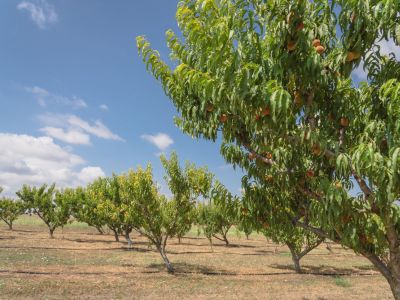Where to Plant Fruit Trees
Site selection is critical to the success of fruit tree production. Fruit trees require full sun but will tolerate part shade; however, fruit quality will be diminished. Deep, sandy loam soils that drain well are best. For heavy soils, plant fruit trees in raised beds or on berms built up to improve drainage. For those with a limited garden area, small-sized fruit trees can be planted amongst ornamentals. Eradicate weeds in the planting area the year before it is time to plant trees. Perennial weeds such as Bermuda grass and Johnson grass compete for nutrients and moisture with young fruit trees. Keep weeds at bay, especially the first few years, as trees become established.
Southern Fruit Tree Varieties
Choosing fruit trees for South Central states also takes some planning. Determine the kind of fruit you want and how many cultivars and quantities of each you will need. Many fruit tree flowers need pollen from a second cultivar of the type of fruit you are growing in order for pollination to occur. This is called cross-pollination. Some fruit cultivars are self-fertile, which means they produce the pollen on their own trees to set fruit. It’s also important in the South to be aware of chilling requirements for the fruit you would like to grow. Fruits need a certain number of cold winter hours between 32- and 45-degrees F. (0-7 C.) for sufficient dormancy. Choose disease-resistant varieties as well as heat tolerant. Southern fruit tree varieties for the South-Central states of Oklahoma, Texas, and Arkansas that have been researched and tested for the home garden are listed below.
Oklahoma Fruit Tree Varieties
Apple
LodiMcLemoreGalaJonathanRed DeliciousLibertyFreedomArkansas BlackGolden DeliciousBraeburnFuji
Peach
CandorSentinelRedhavenRelianceRangerGlohavenNectarJayhavenCresthavenAutumngloOuachita GoldWhite HaleStarks EncoreFairtime
Nectarine
EarliBlazeRedchiefCavalierSungloRedGold
Plum
StanleyBluefrePresidentMethleyBruceOzark Premier
Cherry
Early RichmondKansas SweetMontmorencyNorthstarMeteorStella
Pear
MoonglowMaxineMagness
Persimmon
Early GoldenHachiyaFuyugakiTamopanTanenashi
Fig
RamseyBrown Turkey
Recommended Varieties for East Texas
Apples
Red DeliciousGolden DeliciousGala
Apricots
BryanHungarianMoorparkWilsonPeggy
Figs
Texas Everbearing (Brown Turkey)Celeste
Nectarines
ArmkingCrimson GoldRedgold
Peaches
SpringoldDerbyHarvesterDixielandRedskinFrankSummergoldCarymac
Pears
KiefferMoonglowWarrenAyersOrientLeConte
Plums
MorrisMethleyOzark PremierBruceAll-RedSanta Rosa
Fruit Trees for North Central Texas
Apple
Red DeliciousGolden DeliciousGala, HollandJerseymacMollie’s DeliciousFujiGranny Smith
Cherry
Montmorency
Fig
Texas EverbearingCeleste
Peach
BicentennialSentinelRangerHarvesterRedglobeMilamMajesticDenmanLoringBelle of GeorgiaDixielandRedskinJeffersonFrankFayetteOuachita GoldBonanza IIEarly Golden Glory
Pear
OrientMoonglowKiefferLeConteAyersGarberMaxineWarrenShinseiki20th CenturyHosui
Persimmon
EurekaHachiyaTanenashiTamopan
Plum
MorrisMethleyOzark PremierBruce
Arkansas Fruit Tree Varieties
In Arkansas, it’s recommended to grow apples and pears. Stone fruits such as peaches, nectarines, and plums are more difficult because of their susceptibility to pests. Apple
Ginger GoldGalaWilliam’s PridePristineJonagoldSuncrispRed DeliciousEnterpriseGolden DeliciousArkansas BlackGranny SmithFujiPink Lady
Pear
ComiceHarrow DelightKieferMaxineMagnessMoonglowSeckelShinseiki20th Century
